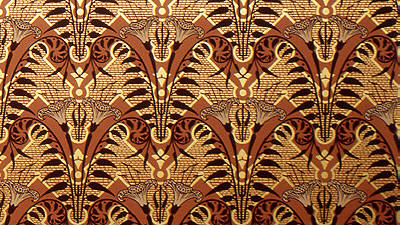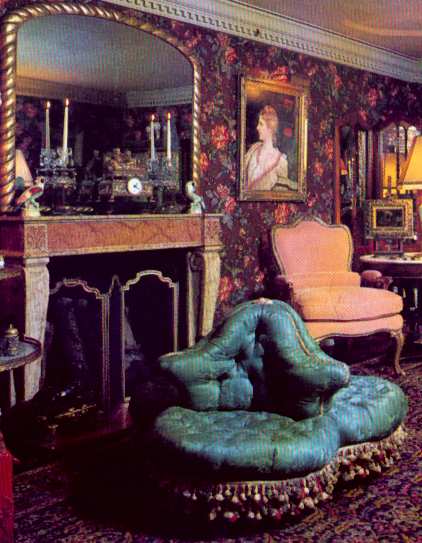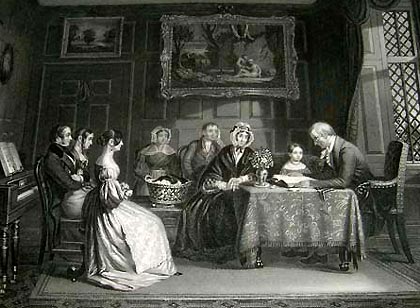








The Victorian family was many things to the individual, life at home was a retreat from the outside world where one could find refuge and not be inhibited by society. Many characteristics of family are constant throughout the centuries, but what set the Victorian family apart and made it unique were the circumstances of the time and how Victorian society in each class dealt with those circumstances.

The Escape From the Outside and the Retreat Within
The idea of the family and home as the escape from society, a safe haven, has been represented in many of the novels we have read including Great Expectations, Middlemarch, and Tess of the D'Urbervilles. As stated in A Prison of Expectations, “The Victorian home, was idealized as a ‘walled garden”, a recuperative oasis from the materialistic corruptions of the outside world." (6) The family represented "the most important symbol of stability and continuity, the only embodiment of a tangible past in a period of rampant change and self-seeking individualism".(6)
In Great Expectations, Pip returns home when he grows ill from all his troubles in London society.(1) At his home, he is nursed back to health by his family, Joe and Biddy. This shows the theme of family and home being a place where one could rest and heal. The contrast is made sharper in that Pip lives in an apartment in London, where the masses make living less intimate and that he is living on his own without his family. Although Pip never visited Joe and Biddy when times got tough for them, they still took him in and cared after him. One could always go home to seek refuge. And in Tess of the D'Urbervilles, Tess returns home to her family after her marriage falls apart.(4) Indeed, home and family were almost a second life to individuals in the Victorian period. A second life that they would live on certain occasions or when necessary. The character of Wemmick in Great Expectations returns to his castle-like home with his "elder" father and his love Miss Skiffins every weekend.
This trend seemed to be the foundation of the family and home. Although the home and family as a separate world from society was the general ideal, it had variations throughout the classes. As stated in Work, Gender, and Family in Victorian England, “The Victorian middle class saw the family through its own vision of domesticity. In this vision, the division of the world in separate spheres, public and private, was premised on the belief in the differing characters and abilities of men and women. Men entered the public world of business and politics, where their rationality, aggressiveness and intellectual power allowed them to succeed. Women remained at home in order to cultivate their moral and nurturing characters, which they used to guide their children and husbands. While this model reflected the experience of middle-class families, Victorians considered it a universal one to which all should aspire. For most, it was axiomatic that the family should be the primary focus on life. Another described the home as the crystal of society; it is the school of civilization; it is the center around which the moral and social world revolves.” (6)
The Different Retreats
For each class, the family household, the place of refuge from the outside world, differed. For the upper-class the refuge was a grand and comfortable escape as shown in the picture below.
Upper-Class Retreat

For the middle-class, the escape was comfortable and humble, as seen in the picture below of a middle-class home.
Middle-Class Retreat


The theme of there being "no place like home" was prevalent during the Victorian Period. Home represented all that was comforting and nurturing; as well as a place of the past where one first began to learn about life outside of society. Home was tied to family just as an umbilical cord is to a newborn baby. Although the structure of each house differed among the classes, the one thing that almost always did not differ was having a family at home. When Pip grew ill, he went home. When Tess's marriage fell apart, she went home. When Lydgate from Middlemarch went into debt, Rosamond desired to go home. (2) When Wemmick had a busy week of playing his societal role, he went home to his castle to escape and resume his family life. Yes, in the Victorian Period, home was an escape and family was a rescue.





It was a held belief that the family was responsible for bestowing morals and beliefs upon all its members. This is depicted in the picture above where the father of the household is exerting his parental authority and reading his beliefs, presumably from the bible, to his family. As stated in A Prison of Expectations, “The ability of the home to serve as a moral regulator depended on its ability to counter the effects of the marketplace and the world upon the members of the family. Without the strict separation of public and private worlds, it would be difficult to prevent the outside world from corrupting the family". Furthermore, Middle-class observers often seized upon the differences in working-class families to criticize them. In their view, the problems of working-class life could be traced to the moral fallings of individuals and an inadequate home life.(6)
The factory "separated family members" and took away women and children in the "worsted trade" from the direct supervision of fathers and husbands.(5) The decline of available work at home was responsible for a greater division between the domestic and work worlds. This was a trend "reinforced by the tendency for children to work and go to school". It is noted that observers at the time believed "that the ample opportunities for work for women and children in the worsted trade undermined the normal patterns of authority within the working-class family by allowing women and children to earn independent income." Furthermore, "to many, such earning power, in conjunction with the decline of older skilled trades, implied a lessening of parental authority.”(5)
We see a prime example of these circumstances through the lower-class perspective in North and South, where Nicholas Higgins works in a factory and must lead a simple life.(3) When his daughter Bessie goes in to work she gets sick and cannot work again, this placed a heavier burden on the family. Higgins is always at work and is unable to stay home with Bessie and watch over her. In addition, Higgins is always trying to keep his daughters from believing in grand ideas that he believes belong to the rich, such as religion. Under his parental authority, he tries to keep them humble and teaches them not to strive for that which means nothing to them in the real world. However, due to the rigorous hours that a factory job requires, Higgins cannot prevent Margaret Hale from bestowing her "ideas" onto Biddy; whether good or bad.
The family in the Victorian Period held the responsibility to shape each family members morals and beliefs. This was important because it reflected on the family itself. Parental authority faced a challenge in maintaining its grip on the working children who were becoming independent and self-reliant. However, whatever the circumstances, each family still attempted to instill their own beliefs into their children and society still expected them to.
Click on the desk for Works Cited




This family room was furnished by Omar F. Najera
Click on the Entrance Foyer to choose another room in the Victorian Family household